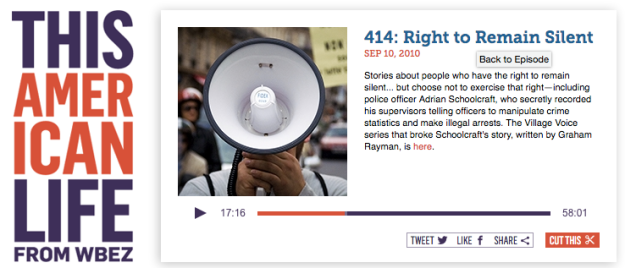In a previous post I talked about how data journalism stories are told in different ways on TV and in online video. I promised I’d do the same for audio and radio — so here it is: examples from my MA in Data Journalism to give you ideas for telling data stories using audio.
As with any audio post, This American Life features heavily: not only is the programme one of the best examples of audio journalism around — it also often involves data too.
Right To Remain Silent is one particularly good example, because it’s about bad data: specifically. police who manipulated official statistics.
You might also listen to Choosing Wrong, which includes a section about polling.
Another favourite of mine is an audio story by The Economist about the prostitution industry, based on data scraped from sex trade websites: More bang for your buck (there are even worse puns in the charts).
David Rhodes, a BBC data journalist, has a range of stories on his Audioboom account, including pieces on Radio 4, Radio 5 Live, and this piece from the excellent factchecking radio programme, More or Less.
In podcasting this episode of The Allusionist tells a story about an experiment with data and dating.
Finally, I have to include an episode of Radiolab, one of my favourite podcasts. Shots Fired — which is split into two episodes — employs the common approach of interviewing the journalist who undertook a data-driven investigation (in other words, hooking the story on the journalist’s ‘quest’). It’s embedded below. For a geekier trip, try their podcast about Benford’s Law.
UPDATE [July 2018]: here’s a collection of radio treatments from BBC Radio Ulster’s Good Morning Ulster of a story by the BBC Shared Data Unit on police cuts. It includes an interview with the reporter, Alex Homer, a studio discussion (at 2’50), an interview with a representative of a community association (at 9’30) and the police (10’40).
UPDATE [August 2018]: NPR uncover some very poor data in The School Shootings That Weren’t — the online article includes a radio version at the top of the story.
Podcasts about data journalism
There are also many great podcasts about data itself — one of my former students compiled a list for GIJN:
UPDATE [January 2020]:
Reach’s data journalism team launched a podcast dedicated to data-driven stories (also on Spotify) in November 2019. You can also listen to an audio interview with the person behind it, Annie Gouk, on Journalism.co.uk.
UPDATE [September 2020]:
Kelly-Anne Smith‘s podcast looks at gender representation on TV and how that’s poorly measured by standard metrics. And Planet Money‘s U.S. Home Prices, Sung As Opera (via Niels De Hoog) is a great example of turning numbers into sounds.
UPDATE [November 2020]:
Podcaster and broadcaster Tim Harford was interviewed for OJB on telling stories about data using audio.
Loud Numbers is a new podcast on data sonification (turning data into sounds and music). The associated newsletter is also worth subscribing to.
The BBC World Service‘s Audiographs is another example of using sonification, while Reveal write about turning data into sound (and open up their tools for others to use) here.
UPDATE [February 2021]:
The Economist has also launched a data journalism-based podcast around Coronavirus — The Jab.
UPDATE [April 2021]:
Datajournalism.com interviewed six experts on “producing data journalism for radio” here.
UPDATE [October 2022]:
Datajournalism.com’s article on putting data analysis into a radio programme has lots of useful tips and examples.
If you’ve heard any other examples of data stories being told through audio, please let me know — I’m always on the lookout for more!


Reblogged this on do not drop the ball.
Reblogged this on Matthews' Blog.
Hi,
I’ve listed podcasts for data journalists a while back; you might find this interesting too:
http://datajournalistiek.nl/en/journalism-2/data-podcasts/
Best, Winny
Hi,
A while ago I listed interesting podcasts for data journalists – thought you might like this list:
http://datajournalistiek.nl/en/journalism-2/data-podcasts/
Best, Winny
Nice post. Data journalism is growing to be a vital aspect of the industry.
Pingback: Data journalism on radio, audio and podcasts | Jornalismo Sem Fronteiras
Pingback: Teaching data journalism — fast and slow | Online Journalism Blog
Pingback: FAQ: Books to read in preparation for doing a data journalism course | Online Journalism Blog